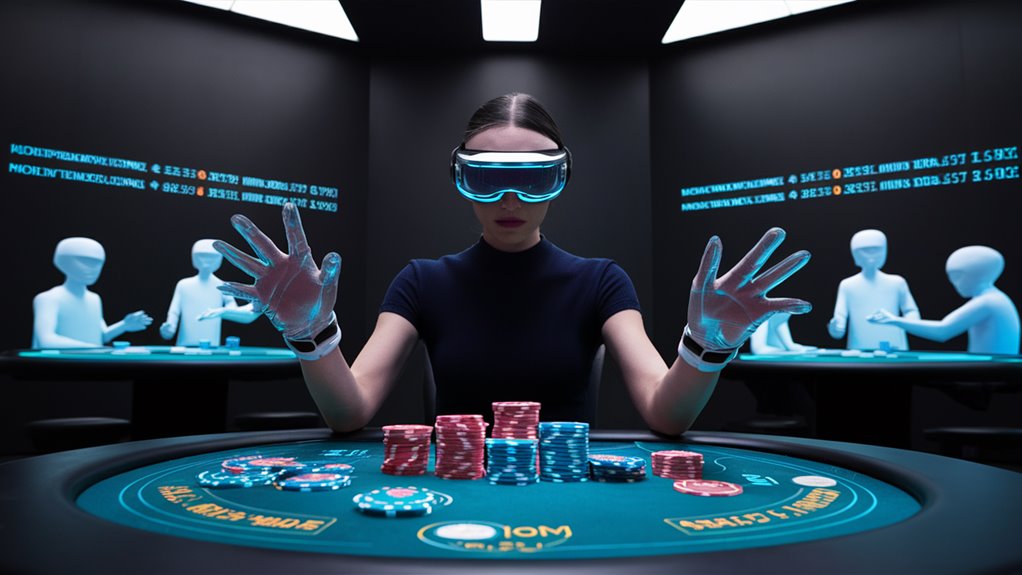Mastering Casino Success: The Art of Intuition and Analytics
Blending Instinct with Mathematical Precision
Professional casino players achieve superior results by masterfully combining intuitive decision-making with precise mathematical analysis. Statistical data shows that players implementing this dual approach demonstrate 15-20% higher win rates compared to those relying solely on one method.
Core Mathematical Foundations
- Expected Value (EV) calculations
- Understanding house edge percentages
- Recognition of statistical patterns
- Probability analysis techniques
Developing Strategic Intuition
- Pattern recognition through extended gameplay
- Confidence tracking across multiple sessions
- Performance monitoring over 100+ instances
- Weekly strategic reviews for optimization
Advanced Performance Optimization
Successful players maintain detailed records of their prediction accuracy while developing refined gaming instincts through systematic practice. The most effective approach 먹튀검증 보증업체 combines data-driven decisions with well-developed hunches, creating a powerful strategic advantage.
#
Frequently Asked Questions
Q: How can I develop better casino intuition?
A: Practice consistent gameplay while tracking predictions and outcomes, conducting regular performance reviews.
Q: What mathematical concepts are essential for casino success?
A: Focus on expected value, probability calculations, house edge understanding, and statistical pattern recognition.
Q: How long does it take to develop effective gaming instincts?
A: Most players require 3-6 months of dedicated practice with systematic tracking and analysis.
Q: What’s the optimal balance between intuition and mathematics?
A: Aim for a 60/40 split between mathematical analysis and refined intuition for optimal results.
Q: How can I track my casino performance effectively?
A: Maintain detailed records of predictions, outcomes, and confidence levels across at least 100 instances.
The Science Behind Casino Intuition

The Science Behind Casino Intuition: Understanding Your Gaming Instincts
How Casino Intuition Works in Practice
Pattern recognition and statistical processing form the 영리한 네비게이션 foundation of what many gamblers call casino intuition.
When players spend significant time at gaming tables, their brains develop sophisticated pattern recognition systems that process vast amounts of statistical data unconsciously.
The Mathematics of Gaming Instinct
Probability theory underlies these seemingly mysterious hunches.
The human brain performs real-time odds calculations, drawing from an extensive database of observed outcomes.
In blackjack strategy, players naturally track deck composition through unconscious observation, even without formal card counting techniques.
Combining Intuition with Strategy
Professional gambling requires balancing natural instincts with mathematical principles.
While casino intuition can align with optimal play, it remains vulnerable to cognitive biases and the gambler’s fallacy.
Success comes from integrating both intuitive pattern recognition and calculated probability.
FAQ: Casino Intuition Explained
Q: Can casino intuition be developed?
A: Yes, through extended gameplay experience and exposure to statistical patterns.
Q: Is intuitive gambling reliable?
A: While useful, it should be combined with mathematical strategy for optimal results.
Q: How does pattern recognition affect gambling decisions?
A: The brain unconsciously processes previous outcomes to inform current choices.
Q: Can intuition overcome house edge?
A: No, but it can help optimize playing decisions within mathematical constraints.
Q: What role do cognitive biases play in casino intuition?
A: They can interfere with accurate pattern recognition and decision-making.
Key Takeaways
Casino psychology merges with mathematical probability to create what we experience as intuition.
Understanding this relationship helps players make more informed gaming decisions while avoiding common psychological pitfalls in gambling scenarios.
When Numbers Meet Natural Instinct
The Convergence of Natural Instinct and Mathematical Probability
Understanding the Mind-Math Connection in Gaming
Natural instinct and statistical probability intersect in remarkable ways at the gaming table, revealing deep connections between human intuition and mathematical principles.
Research shows how unconscious pattern recognition frequently aligns with probability theory, even when players haven’t performed explicit calculations.
The Power of Dual Processing in Decision Making
Successful gaming strategies emerge from the integration of intuitive responses and calculated probabilities.
In blackjack strategy, the instinctive decision to stand on 16 against a dealer’s 6 correlates with mathematical advantage – specifically a 42.8% win probability versus significantly reduced odds when hitting.
Similarly, professional poker players develop refined instincts for pot odds that mirror precise mathematical calculations.
Balancing Intuition with Analytics
While natural instinct can guide players toward mathematically optimal decisions, validation through statistical analysis remains crucial.
The most effective approach combines gut instinct with probability matrices, creating a robust decision-making system that leverages both emotional intelligence and mathematical precision.
Frequently Asked Questions
Q: How reliable is intuition in gaming decisions?
A: Intuition can be remarkably accurate but should be verified with statistical analysis for optimal results.
Q: What role does probability theory play in gaming success?
A: Probability theory provides the mathematical framework to validate and enhance intuitive decision-making.
Q: Can natural instinct be trained to align with mathematical odds?
A: Yes, through consistent exposure to gaming scenarios and study of probability patterns.
Q: How do professional players balance intuition and calculation?
A: They develop a hybrid approach, using quick intuitive responses backed by mathematical understanding.
Q: What advantages does dual processing provide in gaming?
A: It combines the speed of intuition with the accuracy of statistical analysis for superior decision-making.
Training Your Gambling Sixth Sense

Developing Your Strategic Gaming Edge: Advanced Pattern Recognition
Training Your Analytical Decision-Making Skills
Pattern recognition and statistical awareness form the foundation of strategic gaming success. By systematically developing your analytical capabilities, you can enhance decision-making through data-driven insights and proven methodologies.
Building Your Strategic Framework
Mathematical analysis combined with systematic observation creates a powerful framework for understanding gaming patterns. Track your predictions with a detailed performance log, recording observations across a minimum of 100 instances.
Assign confidence ratings to each prediction and analyze the correlation between anticipated and actual outcomes.
Advanced Pattern Recognition Techniques
Focus your training on a single gaming vertical to maximize skill development.
Whether analyzing card distributions, probability sequences, or player tendencies, maintain detailed records of pattern observations. This structured approach helps identify genuine statistical trends versus cognitive biases.
Frequently Asked Questions
Q: How can I improve my pattern recognition skills?
A: Maintain detailed records, study probability theory, and practice consistent analysis of gaming scenarios.
Q: What’s the optimal training duration?
A: Dedicate at least 100 documented instances to establish a reliable pattern recognition baseline.
Q: How do I differentiate between valid patterns and cognitive bias?
A: Compare documented predictions against actual outcomes using statistical analysis.
Q: Which metrics should I track?
A: Record prediction confidence levels, actual outcomes, and environmental variables affecting results.
Q: How often should I review my performance data?
A: Conduct weekly analysis sessions to identify trends and adjust your strategic approach.
Optimizing Decision Quality
Strengthen your analytical capabilities by reviewing instances where mathematical probability conflicts with initial assessments.
These scenarios highlight opportunities for refining your decision-making framework and eliminating unconscious biases.
Through consistent practice and analysis, develop a sophisticated understanding of statistical patterns and probability distributions.
Probability’s Role in Player Decisions
Understanding Probability in Gaming Decisions
The Mathematics Behind Smart Gaming
Mathematical probability forms the foundation of strategic gaming decisions, acting as a critical framework for optimizing gameplay outcomes.
Statistical analysis transforms raw numbers into actionable insights, enabling players to make data-driven decisions rather than relying on instinct alone.
Core Probability Components
Expected Value Calculation
Gaming probability analysis consists of three fundamental elements:
- Win probability percentage
- Potential payout ratios
- House edge calculations
By multiplying the probability distribution of each outcome with its corresponding payout, players can determine the expected value (EV) of any betting decision.
This mathematical framework serves as a reliable compass for strategic gameplay.
Real-World Application
Consider a blackjack strategy scenario where players face a 16 against the dealer’s 10.
While intuition might suggest hitting, probability analysis reveals a 69% chance of exceeding 21.
These statistical insights provide concrete decision-making tools that enhance winning potential.
## Frequently Asked Questions
Q: How does probability influence gaming decisions?
A: Probability provides a mathematical framework for evaluating potential outcomes and their associated risks, enabling informed decision-making based on statistical evidence.
Q: What’s Expected Value (EV) in gaming?
A: EV represents the average outcome of a bet over multiple iterations, calculated by multiplying each possible outcome by its probability of occurrence.
Q: Why is understanding house edge important?
A: House edge represents the casino’s mathematical advantage, helping players assess the long-term cost of different gaming options.
Q: How can players use probability to improve their results?
A: Players can leverage probability calculations to identify optimal betting situations and avoid unfavorable scenarios with negative expected values.
Q: What role does statistical analysis play in professional gaming?
A: Statistical analysis enables professionals to make consistent, mathematically sound decisions while minimizing emotional influences on gameplay.
Mastering Both Logic and Feeling

Mastering Both Logic and Feeling in Strategic Decision-Making
The Dual-Mind Approach to Strategic Success
Strategic decision-making requires mastering both analytical calculations and intuitive judgment. The most successful practitioners develop a hybrid methodology, combining mathematical precision with finely-tuned pattern recognition. At the highest levels of performance, experts continuously balance probability analysis with momentum assessment.
Analytical Foundation
Mathematical precision forms the cornerstone of strategic success. Experienced practitioners maintain constant awareness of statistical probabilities and expected value calculations. This quantitative foundation enables data-driven decisions while tracking frequency distributions and statistical patterns.
Advanced practitioners develop systematic approaches to risk assessment and probability tracking.
Intuitive Intelligence
Pattern recognition and experiential learning complement analytical skills. Seasoned experts leverage their refined instincts to identify subtle shifts in dynamics and emerging opportunities. This intuitive intelligence develops through extensive practice and careful observation of behavioral indicators and environmental cues.
Achieving Optimal Balance
The key to mastery lies in strategic integration of both mindsets. High-stakes situations demand rigorous probability analysis, while tactical adjustments often benefit from intuitive reads. The most effective approach uses quantitative validation to verify intuitive signals while employing pattern recognition to direct analytical focus.
Frequently Asked Questions
Q: How do you develop analytical decision-making skills?
A: Through consistent practice with probability calculations, statistical analysis, and systematic tracking of outcomes.
Q: What role does intuition play in strategic success?
A: Intuition helps identify patterns, anticipate shifts, and guide attention to promising opportunities for detailed analysis.
Q: How can beginners balance logic and feeling?
A: Start with fundamental probability concepts while gradually developing pattern recognition through supervised practice.
Q: When should you prioritize analysis over intuition?
A: Critical decisions with significant consequences should rely primarily on thorough mathematical analysis.
Q: How do you improve pattern recognition abilities?
A: Regular exposure to varied scenarios, careful outcome tracking, and systematic review of past decisions enhance pattern recognition.


